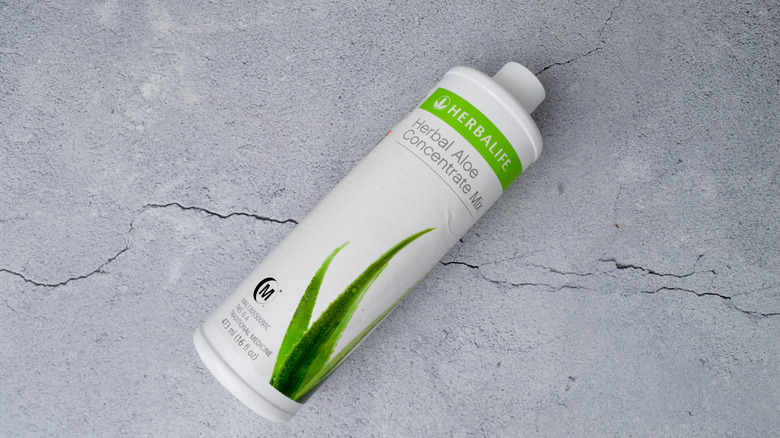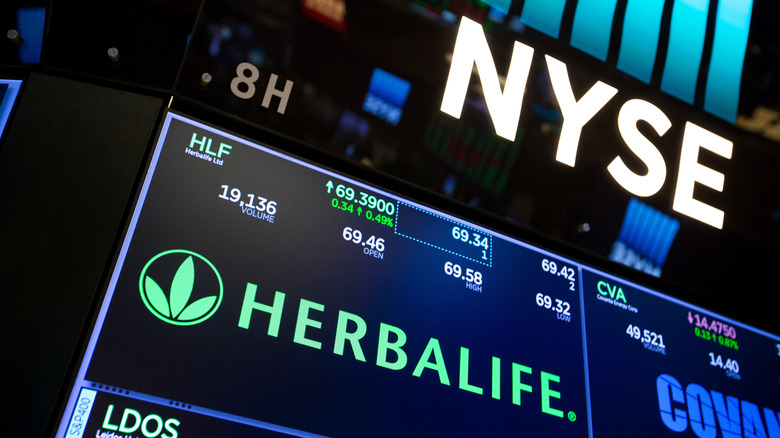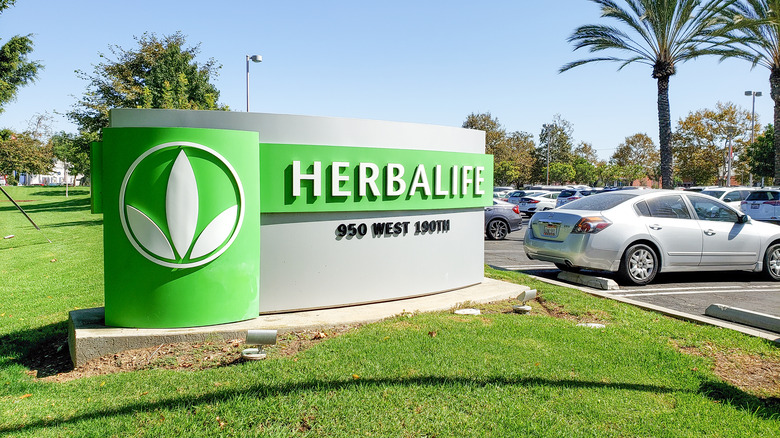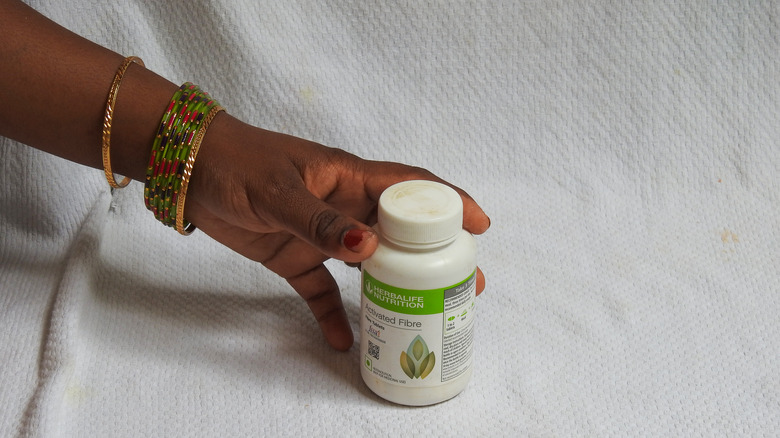The Untold Truth Of Herbalife
So what do you think when you hear about Herbalife? Perhaps an early episode of The Office where an enthusiastic Michael Scott tries to convince the office about joining a pyramid scheme. Or the time when John Oliver joked about it on his HBO show and pointed out why he thought it was, again, a pyramid scheme (via YouTube). Herbalife is the focus of many horror stories on the internet — a quick Google search reveals that. And yet, the company continues to grow. Its share prices have been consistent, if not promising. Herbalife said in its 2018 annual report that it employed 8,900 people worldwide (via Herbalife). The report also highlighted that it operated in 94 countries and had a network of around 4.5 million members and distributors who worked independently.
The company claims that it aims to change the nutritional habits of the world (via Discover Good Nutrition). Yet, there have been several complaints and investigations around its products and structure. Many of its recruiters have lost money. The company had to send out settlement checks amounting to $200 million to 350,000 distributors in 2017, per Los Angeles Times.
Since 1980 — the year Mark R. Hughes started Herbalife Nutrition — the company has paid out settlements and tried to address grievances, but its trouble run never ends. Amid all this, the company continues to make a profit. So, here's the untold truth about Herbalife that reveals its approach to ethics over the years and why it has been the center of attention.
The Herbalife diet for weight loss is not for everyone
The weight loss industry reached a new height in 2019. It grew to $78 billion (per Marketresearch.com). People want to lose weight, and many of them want to lose weight fast. So naturally, companies want a share of this market, and some even launch their products with absurd promises. Herbalife has a weight loss program too, which it claims "has been designed for the person who want to lose their weight in a faster way to achieve body wellness," according to Herbalife Nutrition. So what's the truth about the Herbalife weight loss program — is it for everyone?
Well, no. The program has less to do with a regime and more to do with selling its product, which critics say can "help people lose weight in the short term," but can be "expensive and may not be sustainable," according to Healthline. Their review of the weight loss program says that the shakes are highly processed, with ingredients such as protein isolates, fibers, sugars, synthetic vitamins, gums, artificial flavors, and emulsifiers.
Besides, a lot of people should just avoid the diet. People with sensitivities, allergies, or intolerances towards the shake's ingredients must avoid this weight loss program and its products. It always helps to know what you are consuming, and a look at a program's label just highlights that. It's high in sugar too — 40 percent of the calories from its servings come from sugar, which goes against WHO's recommendation of consuming no more than 5% of daily calories from added sugar (via Journal of Dental Research).
Herbalife's stocks have been at major risk in the past
It hasn't been an easy road to profit for Herbalife. Its business ethics have been questioned, and the company had to fight lawsuits and explain itself time and again. But, in those tedious battles, there's one engagement that the company might like to remember, at least for the perseverance of its opponent. It was a fight that lasted five years long. It even had Herbalife reevaluate its operations and make some significant changes in its workflow and business model.
In February 2018, The New York Times reported that William A. Ackman — one of the vocal hedge fund managers on Wall Street — ended his costly campaign against Herbalife, claiming it engaged in fraud practices. He devoted plenty of energy to convince the federal bodies to take action against the company and even boasted that the company's stocks would reach a new low. His grievances were heard, but it wasn't enough to limit Herbalife's expansion. Instead, Herbalife agreed to pay $200 million and hire an outsider to help make significant changes to its operations.
Despite the severity of the market situation, Herbalife emerged victoriously. At the beginning of Ackman's campaign — featuring a three-hour-long presentation called "Who Wants to Be a Millionaire?" '— Herbalife shares plunged to around $34. When the campaign ended in February 2018, Herbalife's shares stood at $92. A clear win.
Herbalife supplements could damage your liver
Herbalife's packed in soothing green — a color that pleases the eye and offers the value of trust in nature. But it can also be an effective marketing strategy. Psychologists say that the color green evokes feelings associated with peace, security, and rest (via Impact). Even doctors use green in their clinics to help ease patients. The point of marketing is to help attractively present an entity, even if its offering does not meet health standards.
According to Healthline, several of Herbalife's supplements haven't gone through rigorous testing and remain unregulated by official agencies for purity and quality. Its supplements are known to have caused liver damage, according to PubMed, and some cases have been fatal. There have also been some products that have been contaminated by bacteria overgrowth, which has also been linked to liver damage (via PubMed).
Herbalife attempted to emerge clean amid these allegations. It even funded a study that concluded that Herbalife Formula 1, along with a protein-rich diet, did not negatively affect the liver. Besides, the cost of Herbalife products opens the window to a more transparent and competitive market with ingredients that have a cleaner history than Herbalife's.
Belgium legally called Herbalife a 'pyramid scheme,' almost
It's one thing to call something a pyramid scheme, and it's another to have the court label it as one. While companies find their way around gossip with heavy marketing strategies, court-ruled decisions often restrict their operation.
A lower court in Belgium ruled in favor of the Belgian consumer group, Test Aankoop, which accused Herbalife of being a pyramid scheme that was a fraud for lower-level distributors. Herbalife appealed against the decision, saying that the court's judgment contained factual errors and that its selling strategies were misinterpreted. The lengthy appeal process bore fruits for Herbalife, and it was declared as operating under compliance with Belgian law.
"Herbalife continues to focus on supporting its independent distributors and their customers in Belgium, and the company remains committed to an open and transparent relationship with those distributors and customers, as well as regulatory authorities and all other stakeholders," the company said in a statement (via Los Angeles Times). But Herbalife's troubles didn't end there. NBC reported that there have been other lawsuits that have questioned the company's practices.
Herbalife has raised questions in other parts of the world
The United States is a big market for Herbalife, and so is Asia. So while Herbalife itself has made several claims about its products, a lot of falsification occurs when it lands in the hands of distributors. Only limited room and resources are available to ensure that a statement or promise is true. And when such claims are spread around on Facebook, it's easy for many people to believe the claims.
In 2013, there were reports of concern around a distributor in Delhi who made bizarre claims on her Facebook account, such as the herbal tea "may suppress lung cancer growth," "cause prostate cancer cells to commit suicide," and others. When CNBC requested a clarification from another distributor, their posts were deleted, though the distributor said they received good results from Herbalife products.
India's a multi-billion market for networking-based businesses, according to ETTelecom.com. Herbalife continues to grow as a company worldwide, and get-rich-quick schemes tend to sound appealing for many people, which helps with their expansion. The backlash against Herbalife has been constant. However, the company has not run into significant legal blows, thanks to its marketing strategies, commercials, star signings, and supposed independent market leverage.






